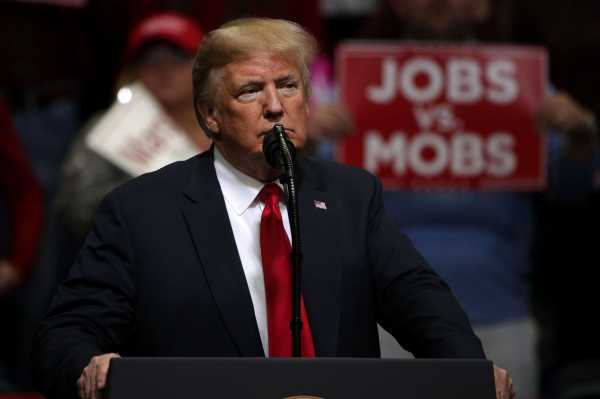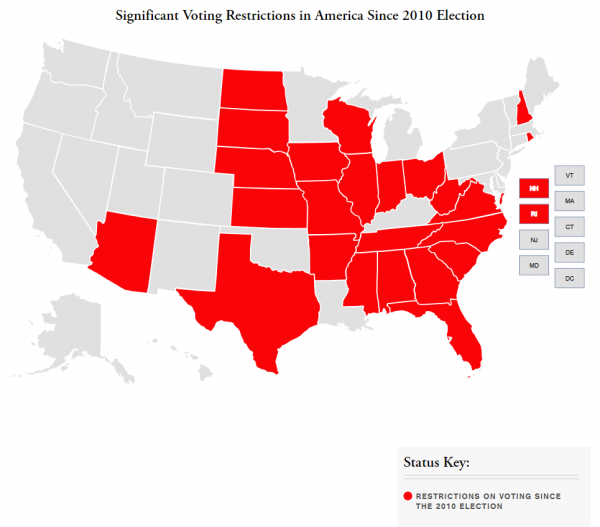
President Donald Trump is apparently angry about voter suppression.
In a tweet on Monday morning, the president wrote, “So funny to see the CNN Fake Suppression Polls and false rhetoric. Watch for real results Tuesday. We are lucky CNN’s ratings are so low. Don’t fall for the Suppression Game. Go out & VOTE.”
Nothing about this tweet makes sense or can be explained, so I am not going to bother. But if Trump wants to get angry about voter suppression ahead of the midterm elections, there are plenty of things to be upset about.
This might be a little awkward for Trump, though — because efforts to suppress voters are coming from his fellow Republicans, who appear to be trying to stop minority voters, who lean Democrat, from casting their ballots.
Here are some examples:
1) Georgia’s race for governor is extremely close, with Republican Brian Kemp and Democrat Stacey Abrams polling within a few points of each other. But Kemp, who’s secretary of state of Georgia, has taken steps that could stop certain groups, particularly black people, from voting.
For example, his office uses an “exact match” process that stops voter registrations if there are any discrepancies, down to dropped hyphens, with other government records. The process has put 53,000 registrations on hold, according to the Associated Press. “Georgia’s population is approximately 32 percent black, according to the U.S. Census, but the list of voter registrations on hold with Kemp’s office is nearly 70 percent black,” the AP reported.
2) Kemp’s office has also aggressively purged voters. In 2017 alone, Kemp eliminated nearly 670,000 voter registrations, according to the AP. The purge is ostensibly meant to remove people who died or haven’t voted in recent elections from the rolls, but it could lead to situations in which people show up to vote only to realize that their registration was abruptly erased.
3) After Democrat Heidi Heitkamp won one of North Dakota’s US Senate seats with strong Native American support in 2012, Republicans first began discussing new voter ID rules. And after a court in 2016 partially blocked the law that Republicans initially passed, the state legislature enacted a new version in 2017 that requires a current residential address to vote.
The move could prevent thousands of Native Americans from voting since many of them live on reservations and, as a result, use PO boxes instead of residential addresses. Heitkamp is on the ballot this year, and her race against Republican Kevin Cramer could help decide which party controls the Senate.
4) In North Carolina, nearly 20 percent of early voting locations were closed this year. According to NPR, the closures are a result of a law passed by the Republican-controlled legislature that requires all early voting sites to stay open from 7 am to 7 pm during the week — which, at least in theory, should have increased early voting hours, but in practice forced some early voting sites to close because they couldn’t meet the requirement.
Since minority Americans are less likely to have flexible work hours or own cars, less access to early voting could disproportionately hurt them. As a swing state, North Carolina doesn’t have a Senate seat up for grabs this year, but could help decide whether Democrats take control of the US House of Representatives.
And this is only the tip of the iceberg.
Since 2010, 24 states have enacted new restrictions on voting. According to the nonprofit public policy think tank Brennan Center for Justice, “13 states have more restrictive voter ID laws in place (and six states have strict photo ID requirements), 11 have laws making it harder for citizens to register, seven cut back on early voting opportunities, and three made it harder to restore voting rights for people with past criminal convictions.”

Republicans argue that the new voting restrictions are meant to combat voter fraud. But studies show that voter fraud is extremely rare in the US; based on a 2012 investigation by the News21 journalism project, there were 0.000003 alleged cases of fraud for every national general election vote cast between 2000 and part of 2012 — and as many as half of those alleged cases weren’t credible.
Democrats argue that that the true goal of the restrictions is to stop minority voters, who are more likely to vote Democrat, from casting a ballot. Indeed, Republicans have at times admitted this. As longtime Republican consultant Carter Wrenn, from North Carolina, told the Washington Post in 2016, “Look, if African Americans voted overwhelmingly Republican, they would have kept early voting right where it was.”
The silver lining for Democrats is that studies have found that new voting restrictions have only a small impact on voter turnout. What most matters in elections, MIT political science professor Adam Berinsky wrote in 2016, is “[p]olitical interest and engagement.”
By showing up, then, people can make a difference — one that can overcome new voting restrictions. In that sense, Trump got one thing right when he wrote, “Go out & VOTE.”
Sourse: breakingnews.ie
0.00 (0%) 0 votes


































